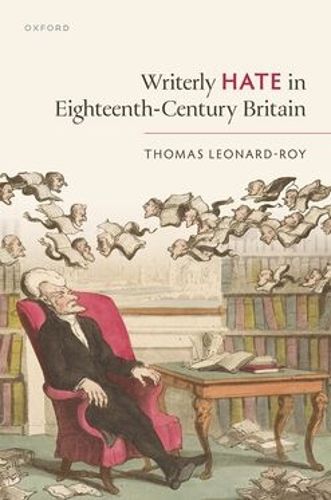Readings Newsletter
Become a Readings Member to make your shopping experience even easier.
Sign in or sign up for free!
You’re not far away from qualifying for FREE standard shipping within Australia
You’ve qualified for FREE standard shipping within Australia
The cart is loading…






The eighteenth century was the great age of hate-writing and hate-reading. Hatred, contempt, resentment, and disdain were immensely generative feelings for authors in Britain, written into not only malicious satires and belligerent pamphlets but also novels, biographies, letters, journals, and the margins and flyleaves of books. Writerly Hate restores the animosities of major authors from across the century--Alexander Pope, Samuel Johnson, James Boswell, Horace Walpole, and Frances Burney--and shows how hatred and its sister feelings were creative forces in a thriving print market and combative literary culture. There was no shortage of invective and abuse in eighteenth-century writing. But authors also hated in a rich variety of other styles: half-joking prejudice, withering criticism, confessional self-hate, haughty 'indifference and contempt', resentful doublespeak. Hate could be harsh and jarring, but it could also be subtle, refined, and dazzling. One does not have to look far to find warnings about hate's harmfulness, but the feeling could also be good in the way it staked out moral principles, condemned cruelty and sin, gave pleasure, and entertained loved ones. Hate vitalized eighteenth-century literary culture, and later helped shape the field of eighteenth-century studies.
$9.00 standard shipping within Australia
FREE standard shipping within Australia for orders over $100.00
Express & International shipping calculated at checkout
Stock availability can be subject to change without notice. We recommend calling the shop or contacting our online team to check availability of low stock items. Please see our Shopping Online page for more details.
The eighteenth century was the great age of hate-writing and hate-reading. Hatred, contempt, resentment, and disdain were immensely generative feelings for authors in Britain, written into not only malicious satires and belligerent pamphlets but also novels, biographies, letters, journals, and the margins and flyleaves of books. Writerly Hate restores the animosities of major authors from across the century--Alexander Pope, Samuel Johnson, James Boswell, Horace Walpole, and Frances Burney--and shows how hatred and its sister feelings were creative forces in a thriving print market and combative literary culture. There was no shortage of invective and abuse in eighteenth-century writing. But authors also hated in a rich variety of other styles: half-joking prejudice, withering criticism, confessional self-hate, haughty 'indifference and contempt', resentful doublespeak. Hate could be harsh and jarring, but it could also be subtle, refined, and dazzling. One does not have to look far to find warnings about hate's harmfulness, but the feeling could also be good in the way it staked out moral principles, condemned cruelty and sin, gave pleasure, and entertained loved ones. Hate vitalized eighteenth-century literary culture, and later helped shape the field of eighteenth-century studies.